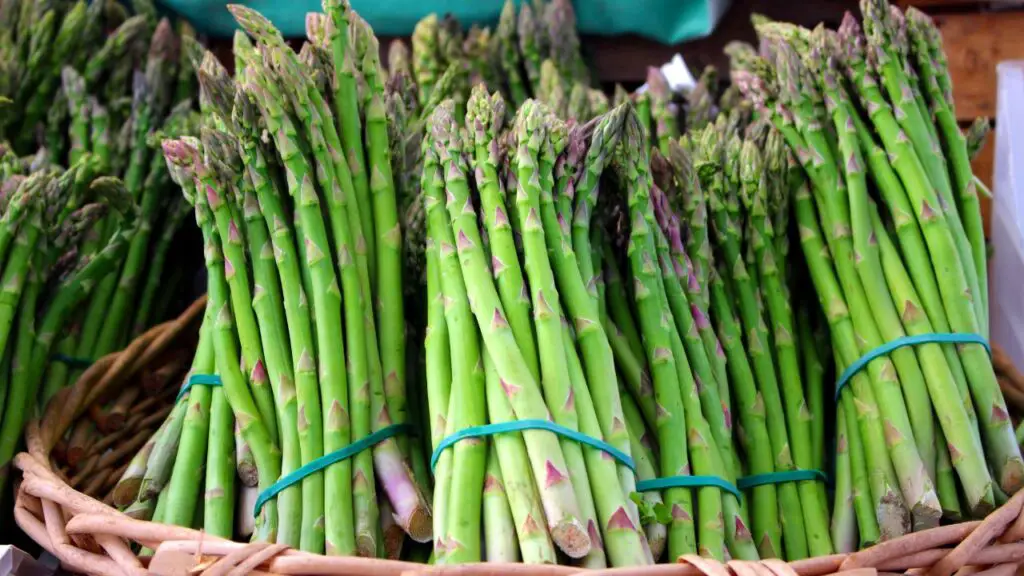Asparagus, are a source of vitamins and nutrients such as vitamin K and C, folic acid, iron, calcium, fiber, and more. So, you’ve probably wondered Can bunnies eat asparagus?
Bunnies can eat asparagus. In fact, adding asparagus to your bunny’s diet will not only be a good supplement. Still, it will also help dissolve uric acid and balance the sodium content in the blood.
But like everything in the bunny diet, it must be in moderation, so you need to know how much asparagus your bunny can eat, whether it can be raw or cooked. And what about asparagus fern?
Can Bunnies Eat Asparagus?
Bunnies can eat asparagus; it is an excellent food for them due to its significant benefits and nutrients.
It contains zinc, calcium, manganese, iron, potassium, magnesium, folic acid, thiamine, riboflavin, beta-carotene, and potassium. In addition, it is an excellent source of vitamins, such as vitamin C, vitamin B6, vitamin K, and vitamin E.
Asparagus has an attractive flavor and structure for bunnies, who will enjoy its crunchy texture.
Other varieties of asparagus are safe for bunnies, such as green, purple and white asparagus, which are the most common in different parts of the world and have a particularly mild flavor and tender texture, and their nutritional differences are minimal.
Incorporating asparagus into your bunny’s diet can also contribute to the dissolution of uric acid and balance the sodium content in the blood, which prevents the onset of diseases such as hypertension.
However, remember that bunnies are sensitive animals and may experience digestive problems if offered a diet rich in certain types of food. Asparagus contains some components that can be difficult for bunnies’ digestive systems, such as cellulose and fiber.
Benefits Of Asparagus for Bunnies

Bunnies require a large amount of fiber in their daily diet, and asparagus is a rich source of fiber that helps them meet this need quickly.
Asparagus is 93% water, which makes it one of the least calorie-dense vegetables.
It is ideal if your bunny has weight problems and tends to overeat.
In addition, asparagus is an excellent source of vitamins such as C, B6, K, and E, as well as minerals such as calcium, iron, zinc, magnesium, and potassium, along with essential nutrients such as folic acid and thiamine, they also have been shown to contain high-quality vegetable protein.
Many veterinarians advise adding asparagus to the diet of bunnies when they have kidney problems, as this vegetable has been shown to have the ability to reduce the level of uric acid in the blood and stabilize sodium levels.
Therefore, it is considered beneficial to include asparagus in rabbits’ diets to promote kidney health.
How To Give Asparagus to My Bunny?
If you want to offer asparagus to your bunny, do it in moderation, first offering a small amount and being attentive to his reaction.
The most appropriate way to offer asparagus to a rabbit is 3 to 4 times a week in small portions, raw, fresh, or cooked.
To prepare them, wash them well to eliminate any traces of dirt, insects, or pesticides. Remove the asparagus’s white part and the woody ends since they can sometimes be toxic.
The amount you can give your bunny will depend mainly on his size. While a big rabbit like the Flemish giant only needs a handful of stems, a smaller rabbit like the Netherland dwarf can quickly eat the top of a few.
But, in general, it will be better to give small amounts, as asparagus has a high water content and can cause softer stools.
However, it is also necessary for your bunny to have plenty of water near, as this vegetable is hard, and your bunny will need a lot of water to avoid drowning when eating it.
Also, you can only give asparagus to your rabbit if it is already an adult, as small bunnies may have difficulty moderating it, asparagus can be difficult to digest, and a young rabbit’s digestive tract is not fully developed to process it efficiently.
If the rabbit has sluggish stools in the next 24 hours, likely, it is not ready to consume asparagus.
In this case, it should be eliminated from its diet until its stools return to normal. Waiting at least one week is suggested before reintroducing asparagus or any other new food into the rabbit’s diet.
Can Bunnies Eat Cooked Asparagus?

Bunnies can eat raw and cooked asparagus; in the case of cooked asparagus, it is better without salt and any seasoning.
Cooked asparagus helps your bunny to eat and digest better, even though the bunny’s diet is based on raw and fresh foods, and cooked vegetables lose part of their nutrients. However, the difference is insignificant.
Some owners prefer to offer their rabbits raw and washed asparagus, so it depends on each owner’s preferences.
On the other hand, processed asparagus is unsuitable for them because it uses oil, salt, and other ingredients that can harm your bunny’s health.
Can Rabbits Eat Asparagus Stems?
Rabbits can safely ingest young asparagus stems as long as it is sporadically. These stems are an excellent source of dietary fiber for rabbits.
But only adult rabbits can benefit from the nutrients found in asparagus stalks and can be safely given them. However, don’t give asparagus stalks to baby rabbits under 3 months of age. Their digestive system has yet to develop fully, and they will find it difficult to digest the tough stalk.
Is Asparagus Fern Toxic to Rabbits?

Garden asparagus is not recommended for rabbits as it is toxic for them and pets. Even in small quantities, its sap, as are the berries they produce, is poisonous.
The toxic substance present in this plant is sapogenin, a type of steroid found in several species of plants. Pets should also not touch these plants, as they may cause an allergic reaction.
Although its berries are not poisonous when touched, ingestion or excessive consumption can cause stomach problems and skin sensitivity.
It is necessary to distinguish between garden asparagus, which is edible and healthy, and the asparagus fern. This houseplant belongs to the lily family and is entirely different.
Ingestion of garden asparagus can irritate the gastrointestinal tract, and dermal exposure can cause skin irritation. Some signs to watch for include vomiting, diarrhea, abdominal pain, and skin irritation.
Lastly, asparagus fern has small spines that can be dangerous if ingested.
What If I Give My Bunny Too Much Asparagus?
If you give your bunny too much asparagus, nothing severe will happen, as it is non-toxic and high in water and fiber. However, you will notice some side effects on your bunny.
Some of the symptoms that your bunny will have are stomach problems, loose stools due to the high water content, and a bad smell in his urine, which could make him feel completely sick.
Besides, unwashed asparagus can result in parasitic diseases and potential pesticide-related problems.
Summary
Bunnies can safely eat asparagus as part of their healthy diet. Asparagus is rich in nutrients and beneficial to bunnies’ health.
However, asparagus should not be a daily part of their diet and should be offered in small amounts every two to three days.
Bunnies can eat all components of the asparagus plant, including the stalks, and eat asparagus raw or cooked. Although raw is generally healthier, as long as you offer adequate amounts, asparagus will be a healthy and attractive addition to your rabbit’s diet.
Keep an eye on your rabbit to make sure everything is going well. If it is, the asparagus will be a wonderful regular complement that your bunny will love.





